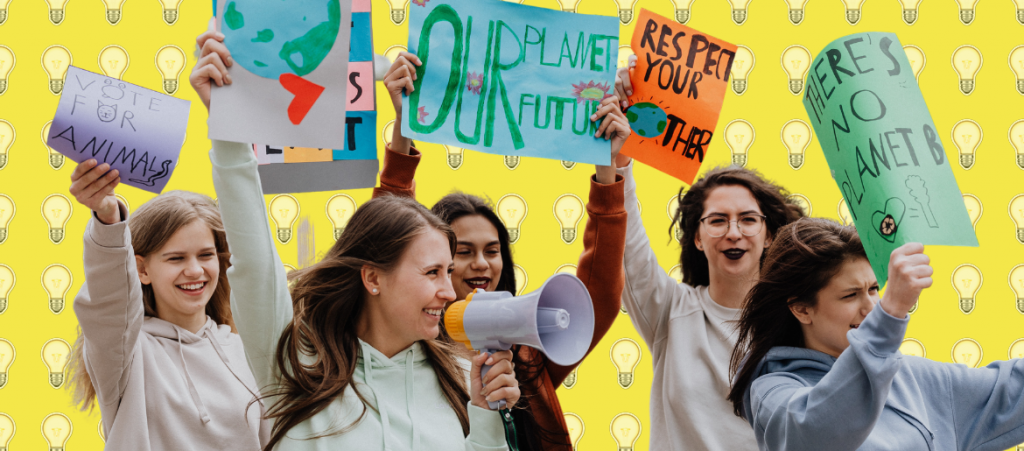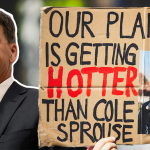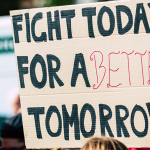
The news cycle is full of problems… but what about solutions? Welcome to IDEAS, a series where we ask experts, thinkers and insiders to share their thoughts on how to tackle the biggest challenges facing young people today, in Australia and around the world.
To kick-off Zee Feed’s new solutions-focussed series, IDEAS, we’re tackling the biggest problem first: the climate crisis. For at least the past decade, young people (Gen Z in particular) have been held up as climate saviours. While businesses and governments have happily framed this problem as one that can be fixed through our individual choices – recycle! Use public transport! Switch your energy provider! – carbon and greenhouse gas emissions continue to cook us all.
It’s time to focus on speed and impact. If the goal is to keep global heating to below 1.5ºC (which it is, obvi) what can be done right now to make the biggest difference? We asked experts from different areas – including climate science, farming, politics, tech and business – for their insight. Here are their answers:
What action or change needs to happen now for Australia to succeed in curbing the climate crisis?

Professor Julie Arblaster
Climatologist and Head of Monash University School of Earth, Atmosphere and Environment
“The most effective way to reduce the impacts from climate change is to reduce emissions of carbon dioxide (CO2) and other greenhouse gases. CO2 in particular is of concern because it has a long lifetime in the atmosphere – once it is there it takes multiple decades to centuries to be removed via natural processes.
So far, technological methods of capturing or removing carbon dioxide from the atmosphere have not been very successful, and are very energy-intensive and costly. It is better to prevent as many additional greenhouse gases from getting into the atmosphere as we can.
We need to rapidly move towards renewable and zero-carbon forms of energy. In Australia we are fortunate to have excellent wind and solar energy resources, and our electricity sector is already transitioning to renewables. Additional leadership from the government is needed to encourage this transition, and acknowledge that the world needs to rapidly move away from coal if we are to reduce the impacts of climate change. As citizens, one of the most important things we can do to curb the climate crisis is to vote for representatives across all levels of government who will act on climate change.”

Dr Anika Molesworth
Farmer with PhD in Agriculture and Environmental Science & advocate for regional Australia
“In far western NSW we are no strangers to droughts, dust-storms and heatwaves – extreme weather events like these are set to become more frequent and more intense. Across the country, farmers are feeling the impacts of climate disruption. Season after season, year after year, records are being smashed in high temperatures and low rainfall. And this has a very real impact on what food can be grown, and where.
Despite being blessed with options to reduce emissions, Australia has some of the weakest targets in the world. The cost of climate inaction is having a devastating impact on Australian farmers, and it will get worse the longer we delay climate action.
We already have the technology we need to drastically reduce emissions, including replacing coal- and gas-power stations with clean and cheap renewable energy backed by storage technologies. The Federal Government needs to aim high, stop delaying, and let Australians seize the opportunities presented by a low-emissions society.”

Ketan Joshi
Climate and clean-tech analyst, journalist & author
“There are obviously a lot of actions we can take! But I have to bring it back to the single most important, impactful and influential move – the first, biggest step in actually bringing about change: Shutting down Australia’s fleet of coal plants before 2030. That’s what’s needed.
The International Energy Agency’s net-zero scenarios show that rich countries need to shut down coal ASAP, by 2030 at the latest. Australia could easily do this with strong planning and action from the federal government. It would put Australia in an excellent position to reduce domestic emissions to align with a 1.5ºC climate scenario.”

Kim Rubenstein
Law Professor & Independent Candidate for Federal Senate (ACT)
“When you look at the polling around climate change, there’s a clear pattern of people in both metro and regional areas wanting the government to do more. So why are so many politicians doing so little, despite what the people who voted for them want? And how do we fix that?
One major factor is that our major parties have gotten caught up in convincing the marginal electorates, with coal and gas industries, to vote for them at all costs. There are initiatives to support people in these electorates into the clean energy economy, but they’re mainly coming from outside of government and lack the serious financial backing they need. The first step is providing more support in the federal budget for these initiatives.”

Alex Andrews
Co-Founder of Verve Super
“Coal has a lower tax rate than all tax-paying Australians. While the business sector does not set these tax rates, it has certainly profited from the degradation of the planet. The number one action the business sector can take is to stop profiting from fossil fuels directly or by providing material services to fossil fuel companies, such as finance.
As a superannuation fund, Verve has chosen not to invest directly in fossil fuel companies or companies that provide material services to the fossil fuel industry. Another policy that could be more widely adopted is to link executive remuneration to environmental outcomes, further incentivising business leaders to prioritise climate action.”

Angus Dorney
Co-CEO of Kablamo
“Even if the world manages to drive down greenhouse gas emissions fast enough to meet the 1.5ºC Paris Agreement commitment, the truth is we’re already seeing the damage of 1ºC of warming in the form of more frequent and severe weather events.
As specialists in data, Cloud, AI and ML, we’ve taken a hard look at how to manage the effects of climate change – like bushfires – with the technologies that we have expertise in. Now we know that these are powerful tools in the fight against climate change, and we’re using them for that purpose.
We need leaders from all sectors to do the same. Lean into their specialties and find ways within their own organisations to commit to tackling both the causes and effects of climate change.”




Comments are closed.